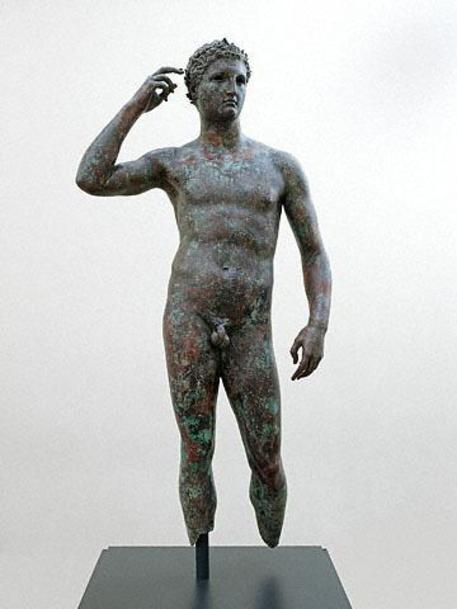(ANSA) - ROME, MAY 2 - The European Court of Human Rights
(ECHR) said Thursday that Italy has every right to demand the
return of a Greek bronze statue, the Victorious Athlete,
attributed to Lysippus (Lysippos) that is currently in the Getty
Villa Museum in Malibu, California.
The court unanimously ruled to reject an appeal filed by the J.
Paul Getty Trust against the confiscation order issued by the
Italian authorities, saying there had been no violation of the
right to protection of property.
It said the Italian authorities acted with the purpose of
recovering an unlawfully exported piece of cultural heritage.
It said the confiscation order had been proportionate to the aim
of ensuring the return of an object that was part of Italy's
cultural heritage "owing to the Getty Trust's negligence or bad
faith in purchasing the statue despite being aware of the claims
of the Italian State and their efforts to recover it".
The statue, which dates from the classical Greek period and is
also known as the 'Athlete of Fano' and the 'Lysippus of Fano',
was discovered by fishermen in the Adriatic Sea, off the coast
of the Marche town of Pedaso, in 1964.
It was sold in 1965 to an unknown party.
In July 1977 the Getty Trust bought the statue in Munich through
a contract concluded in the United Kingdom for $3.95 million.
It entered the United States via Boston in August 1977 and
arrived at the Getty Villa in Malibu in March 1978.
"The Court noted that the domestic authorities had concluded
that the Getty Trust, by purchasing the Statue in the absence of
any proof of its legitimate provenance and with full knowledge
of the Italian authorities' claims over it, had disregarded the
requirements of the law, at the very least negligently, or
perhaps in bad faith," the ECHR said.
"The Court was satisfied that the domestic courts' assessment
had not been arbitrary or manifestly unreasonable".
Culture Minister Gennaro Sangiuliano hailed the European Court
of Human Rights' ruling.
"It's an issue which we have worked on intensively," he said.
"Over 100 works (of art) have been returned from the US since I
became minister, and the same number have come from Great
Britain.
"In addition to that, I have issued a circular letter with which
we have established that no more loans will be made to museums
that have disputes with Italy".
Fano Mayor Massimo Seri told ANSA that the "whole city is
immensely satisfied at the news of the return of an object with
which it has formed an extremely strong bond, even from far
way."
The Lysippos has been contested ever since the Getty bought it
for almost four million dollars in 1977 from German art dealer
Herman Heinz Herzer, paying nearly 800 times the $5,600
that Italian dealers paid the fishermen for it in 1964.
Italy has long claimed the statue was smuggled out of the
country.
The Italian culture ministry has also asked the Getty to return
another four stolen works: a canvas by 19th century painter
Camillo Miola, The
Oracle at Delphi, stolen from the Istituto San Lorenzo in Aversa
near Naples between 1943 and '46; two Roman era marble lions
that were in Palazzo Spaventa at Preturo near Aquila; and a
mosaic of Medusa stolen from the Museo Nazionale Romano.
The ministry has asked the Getty to review the provenance of the
works, which Italy thinks have either been stolen, or exported
without permission.
In the past the Los Angeles-based institute
agreed under duress to hand back some 40 contested art
treasures, including an iconic 5th-century BC statue of
Aphrodite. (ANSA).
>>>ANSA/Getty must return 'Lysippus of Fano' to Italy-ECHR
Govt satisfied as appeal against confiscation order rejected
